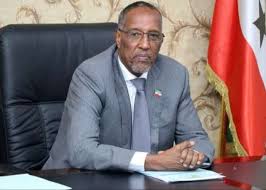

By Ibrahim Abdi
The recent arrest of Osman Omar Dool, a respected politician and activist from the Waddani political party, signals a grave shift in Somaliland’s democratic practices. Mr. Dool, a Norwegian citizen with Somali heritage, has been an outspoken critic of President Muse Bihi’s administration, targeting its transparency failures, frequent election postponements, economic stagnation, and human rights deficiencies.
His apprehension at Egal International Airport was not only inappropriate but also deeply alarming, signaling a calculated effort to stifle dissent. This incident mirrors the earlier arrests of other distinguished figures such as Ms. Busharo Banday—a renowned journalist and activist, Mohamed Illig—the esteemed director of MMTV and a legendary journalist, his team, and Abdilmalik Oldoon—a seasoned journalist and compassionate humanitarian activist, all of whom have previously endured similar or even harsher treatment. Additionally, high-profile leaders and supporters of the Waddani Party have repeatedly faced similar crackdowns. These actions underscore a systematic campaign to intimidate and silence critical voices across the board.
These actions starkly contrast with the democratic values that Somaliland has long championed, values that were meticulously developed over many years. The arbitrary detentions represent a significant backslide, eroding both domestic and international confidence in Somaliland’s commitment to upholding democratic principles.
The release of Osman Omar Dool after two weeks, under significant pressure, barely mends the severe damage done to Somaliland’s reputation as a democratic nation. These incidents not only infringe upon individual liberties but also heighten the risk of civil unrest, as demonstrated by the possibility of violent confrontations following Dool’s detention—a crisis temporarily alleviated by the interventions of both Abdikarim Mooge, the Mayor of the capital, and Sultan Daud Sultan Abdilkadir, the Grand Sultan of Somaliland.
Rather than silencing critics, the government’s measures have inadvertently magnified the causes championed by these detained figures, galvanizing support among opposition members and the broader public. These groups now view the detainees’ struggles as symbolic of a broader battle for democratic integrity and accountability.
It is imperative that Somaliland’s leadership recognize that genuine strength is derived from fostering a pluralistic environment where dissent is not merely tolerated but actively encouraged as a catalyst for progress. The future stability and prosperity of the nation hinge on its ability to genuinely embody the democratic values it professes. This recent wave of arrests should serve as a stark wake-up call, urging a reaffirmation of democratic commitments and a decisive move away from autocratic tendencies. Somaliland must choose to nurture, not stifle, the voices of its people.
more recommended stories
 President Irro’s Diplomatic Reset: A Bold Step Toward Somaliland’s Recognition
President Irro’s Diplomatic Reset: A Bold Step Toward Somaliland’s RecognitionBy Abdi Jama Hargeisa — The.
 Somaliland Pursues Peace: First POW Exchange with Puntland Completed
Somaliland Pursues Peace: First POW Exchange with Puntland CompletedPresident Irro’s Dialogue-Based Approach Gains Momentum.
 From 1960 to Today: Somaliland’s Unbroken Case for Statehood
From 1960 to Today: Somaliland’s Unbroken Case for StatehoodSomaliland’s Foreign Minister Reaffirms Sovereignty, Urges.
 Gogol or Goodbye? Somalia’s Last Opportunity for Federal Reconciliation
Gogol or Goodbye? Somalia’s Last Opportunity for Federal ReconciliationBy Abdirahsid Elmi & Mohamed Musa.

